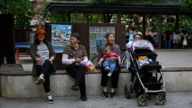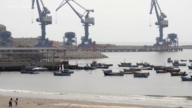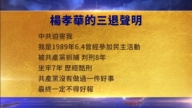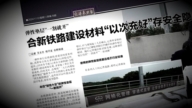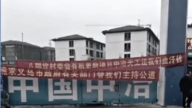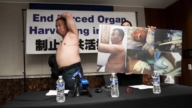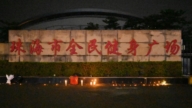【新唐人2011年11月7日讯】中共喉舌媒体发表文章说,群体性对抗背后的诱因,是群众对基层官员缺乏信任,文章警告说,放大的信任危机会直接危及到共产党的执政根基。分析人士认为:中共感觉到了危机,敲敲警钟,要大家注意船要沉了。
中共喉舌《人民日报》3号刊登评论文章,历数近些年来各地发生的群体性事件,并且认为背后的诱因,往往是群众对当地政府及工作人员缺乏信任。文章警告说,干群之间缺乏信任,会极大的削弱基层政权的权威性,放大了的“信任危机”会直接危及到共产党的执政根基。
中国的群体性抗议事件不断,而且有愈演愈烈之势。前山东大学教授孙文广指出,每年群体事件近10万起,而且在逐年递增。
孙文广:“那么这个危机呢,这个发生呢,主要是当局它现在采取的一些政策,造成公民的权力遭到侵犯,甚至有的公民权力被剥夺。民间的诉求没法表达,最后就寻找了一条道路,这个道路呢就是起来示威,或者集会,或者游行。”
《路透社》的报导认为,这篇文章反映了中共官方的担忧。
时事评论员伍凡指出,群众对基层缺乏信任只是个外像,中共的这种说法有失片面,是在推脱责任。
伍凡:“而实在的根本的原因,那有政府,经济、社会文化、道德的下滑,官员的贪污腐败,出卖国土,环境的污染,对法轮功的镇压,对基督徒的镇压,对少数民族新疆、内蒙、西藏的这些镇压等等这一系列的问题,种种都是引起老百姓对它的不满和冲突。”
中国异议人士秦永敏指出,基层官员和民众之间的冲突,问题在于政府背后黑社会化。
秦永敏:“中国(共)一再强调自己的特色,那么这个特色呢,结果就是地方政府和人民群众的直接冲突,它这个冲突呢,问题在于政府背后黑社会化,政府背后黑社会化呢,他们是不择手段的盘剥、敲诈、掠夺当地民众财物。”
孙文广教授指出,群众多数对中共不信任。而从基层干部到中央官员,他们都对中共政权不再信任,纷纷逃离。
孙文广:“你再接触一些基层群众,你就会发现他们对政府、对中共当局多数都抱着一种不信任的态度。现在这个信任危机不光是这个基层干部,中央的、共产党的中央啊,对他们也是不信任的,一种就是把自己的子女家人安排到国外,另外的加紧捞钱啊,捞钱多了就跑到外国去。”
孙文广教授还指出,中共的独裁专制,社会的不公,再加上民众的不信任,一些官员感觉到了生存危机,中国已经到了一个非常危险的时期了。
新唐人记者周玉林、李韵、郭敬采访报导。
CCP Media Foretells of Regime’s Imminent Collapse
A recent article published in one of the Chinese Communist
Party’s (CCP) state-run medias, commented on the fact that
the root cause behind the many large group conflicts in China
is that the public does not trust local officials.
The article warned that, this growing distrust could threaten
the CCP’s ability to govern.
Some analysts say that the CCP has perceived its own undoing;
it is telling its members through the article that a collapse of the whole regime is imminent.
On October 3, the CCP’s mouthpiece, People’s Daily,
published an article describing
what it thinks are the causes behind the recent large-scale
group conflicts in China.
The article attributed most of the conflicts to the public’s lack
of trust in local government organizations and its employers.
The article warned that “The lack of trust people have in
officials will greatly undermine the authority and power of local governments,
which if increased, could threaten the very core of
the CCP’s governing.”
In recent years, group conflicts in China have been steadily
increasing. Sun Wenguang, a former Shandong University professor,
said that every year, nearly 100,000 group conflicts occur
in China, noting that this figure is on a rise.
Sun Wenguang: “This distrust factor mainly revolves
around the many CCP policies that either violate or even strip citizens of their civil rights.
What’s more, the CCP offers no remedy or solution to those
citizens who have been violated.
As such, a lot of people turn to other ways of expressing
themselves, such as protesting or demonstrations.”
A Reuters report weighed in on the matter, saying that
the People’s Daily’s article has reflected the CCP’s anxiety about its own future.
Political commentator, Wu Fan, said that this distrust factor
is the result of the CCP’s tyranny.
However, the CCP is trying to absolve itself from
what it has done.
Wu Fan: “The truth is that the CPP has destroyed
any semblance of normal or traditional social culture and morality.
Its governing style leads to ubiquitous corruption,
the selling off of large chunks of China’s territory to foreign countries,
the destruction of the environment, the persecution of
religious groups such as Falun Gong, Christians
and the suppression of ethnic minorities in XinJiang,
Inner Mongolia, and Tibet.
This is what the CCP has done,
and thus where the conflicts in China stem from.”
Chinese dissident, Qin Yongmin, commented that the conflicts
between the public and local officials results from the CCP’s regime’s gangland-like autocratic rule.
Qin Yongmin: “The CCP is always talking
about “its own characteristics.”
It is exactly these characteristics which serve to perpetuate
conflicts between local residents and local officials.
The real reason these conflicts take place in the first place
is due to the regime’s gangland-like rule
and its practice of grabbing and occupying the residents’
possessions through exploitation, blackmail or plundering.”
Sun Wenguang further pointed out that not only has
the public lost trust in the CCP, but all levels of officials,
from local to the central government, have also shown
a lack of confidence in the CCP and are leaving China in unprecedented numbers.
Sun Wenguang: “If you talked with any ordinary person
in China, you would find that most of them regard the government as unreliable.
This trend has even spread into the local
and central government.
A lot of officials also lack confidence in the CCP’s future.
Some of them choose to move their families abroad,
while others are doing whatever they can to hoard money for
themselves, in preparation for escaping abroad in the future.”
Sun Wenguang said that the CCP’s widespread disregard for
social justice, along with the public’s loss of trust in the regime, has alarmed some officials.
These officials know in their hearts that
the CCP’s very survival is at stake.
NTD reporters Zhou Yulin, Li Yun and Guo Jing


